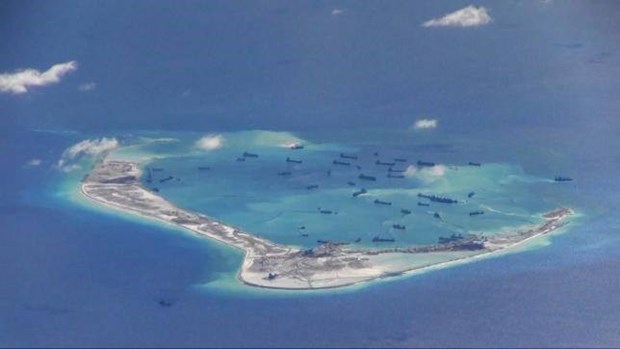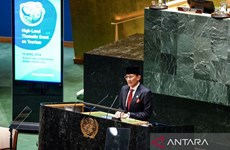US experts talk security, development in East Sea
Experts at a discussion in the US’s Washington D.C. on October 20 examined recent security developments in the East Sea, underlining the serious impacts of activities that change the status quo.
 Chinese vessels operate illegaly in the waters around Mischief Reef, part of Vietnam's Truong Sa archipelago (Photo: Reuters)
Chinese vessels operate illegaly in the waters around Mischief Reef, part of Vietnam's Truong Sa archipelago (Photo: Reuters)Experts at a discussion in the US’s Washington D.C. on October 20 examined recent security developments in the East Sea, underlining the serious impacts of activities that change the status quo.
The event, held by the Foreign Policy Institute, the Maritime Alliance and Johns Hopkins University, was attended by Sally Yozell, senior advisor at the Office of the Under Secretary of State for Economic Growth, Energy and the Environment; professors from US universities; representatives from environmental protection organisations; embassies and journalists.
They shared the view that the East Sea is home to some of the world’s strategic sea lanes, oil and gas reserves, and fishery resources, with about 85 percent of the region’s fishermen depending on the waters for their livelihoods.
Former Washington Times correspondent James Borton said the marine environment and security in the East Sea were under severe threat from recent activities.
He stressed that China’s construction of artificial islands in the East Sea was escalating diplomatic tensions with its Southeast Asian neighbours. The large-scale construction and land reclamation on entities in the waters threatened marine resources and biodiversity, while causing long-term risks to coral reefs.
Although Beijing gave assurances that its activities would not affect security and the marine environment, those claims are not supported by scientific evidence. China has also increased its fishing in the East Sea.
Professor John W. McManus from the University of Miami said land reclamation and fishing activities have seriously marred 80 sq.km. of coral around the Truong Sa (Spratly) Archipelago.
Meanwhile, according to Lieutenant General Wallace Gregson Jr., senior director for China and the Pacific at the Centre for the National Interest, overlapping sovereignty claims and large-scale activities changing the status quo in the East Sea were elevating diplomatic tensions, causing instability and creating imminent risks of conflict.
Experts urged all concerned parties to immediately halt activities that changed the status quo, enhance education about the importance of the East Sea’s environment, and share fishing data so as to solve the aforementioned problems.-VNA













